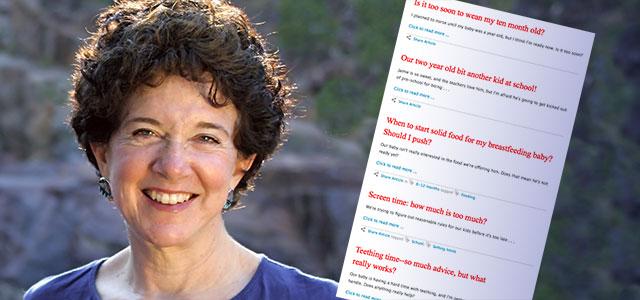
Meg Zweiback, PNP
A Reassuring Voice for Parents
The sleep-deprived new mother and members of her moms’ group were agonizing over conflicting advice about how to get their babies to sleep better at night. “Some of us have been trying to ‘be there’ all the time for our babies, and we’re getting pretty worn out,” the mother wrote. “Now we are hearing that a new study shows that ‘crying it out’ doesn’t damage babies, but many of us don’t want to do that.”
The letter appeared in a Parents’ Press magazine column that is authored by pediatric nurse practitioner Meg Zweiback; in the 1970s, Zweiback was one of the first graduates of the nurse practitioner program at UC San Francisco School of Nursing. Almost 40 years later, she has become a well-known Bay Area parenting educator, consultant and author – and an associate clinical professor in the Department of Family Health Care Nursing – who counsels parents of young children grappling with ordinary but vexing child-rearing issues, from toddler tantrums to baby sleep.
Whether it is in her column or in her one-on-one consulting, Zweiback aims to offer a reassuring voice. In responding to the anguished mother, Zweiback wrote that she doesn’t advocate for one philosophy or another. Instead, she suggested several strategies the mother could try for her particular situation. “Addressing the patterns and finding an appropriate solution will result in much better results than just assuming that your baby needs to ‘cry it out,’” Zweiback wrote.
A Unique Path
There are many ways alumni of the School of Nursing have changed the landscape of health care, including becoming leaders in clinical institutions, public health and academia. Zweiback, however, bristled at the idea of working full-time for any institution, and chose instead to chart her own career path after discovering she excelled at helping parents deal with the everyday challenges of raising kids.
In addition to her monthly Parents’ Press columns, Zweiback has authored four books on toilet training and parenting young children. She speaks frequently at Bay Area hospitals and organizations, such as the Berkeley YMCA Special Needs program and Berkeley Women’s Daytime Drop-In Center. She is also a certified lactation consultant and trained in cognitive behavioral therapy, autism spectrum disorders and managing anxiety in children and adolescents.
And she doesn’t call what she dispenses advice. Rather, she helps parents develop solutions by providing information and perspective on child development and related health issues. Often, parents are wracked by preconceived ideas and need to be reassured that their children’s behavior is developmentally appropriate. “Overall, the children I see are not doing what their parents, or perhaps their teachers or child care providers, think they should be doing.”
Nurse Training Is Key
Zweiback says her UCSF education was “cutting-edge” and gave her the primary care skills to work independently in a helping profession. She says, “Parents know that when they come to consult with me, they will be talking to someone who understands them and will support them with the kind of insight that comes from years of experience and training.”
As with many of her UCSF peers, Zweiback chose nursing because of a strong interest in public service. She grew up in Los Angeles and graduated from UC Santa Cruz with a degree in political science at the height of the Vietnam War and the counterculture movements of the late 1960s and early 1970s. After studying Spanish in Mexico, she worked as a community organizer for the United Farm Workers. Nursing became a consideration after she saw how race and poverty barred people from quality health care and overheard a public health nurse at a café in Mexico talking excitedly about her job.
When Zweiback’s husband, Zack Wasserman, began studies at Stanford Law School, Zweiback decided to see if nursing was right for her by working as a nurse’s aide at the university’s medical center. Making beds and interacting with patients gave her “a wonderful education in what you can do to help people before you get to the medical intervention,” she says.
Then in 1972, Zweiback started at UCSF. It was a time when nurses were increasingly pursuing advanced degrees, advocating for professional empowerment and developing areas of specialization.
As one of just two students admitted who hadn’t already worked as a nurse, Zweiback impressed instructors as a good candidate for the School’s new pediatric nurse practitioner program. One of her professors for her bachelor’s degree courses, retired Associate Dean of Administration Zina Mirsky, remembers Zweiback as a “thoughtful, questioning student.”
Zweiback admits she wasn’t initially interested in pediatrics, but then Barbara Durand, head of the program at the time, became her mentor. Durand saw that Zweiback was a natural. “She has great empathy, really good insights and is just very skilled at working with and talking with parents,” says Durand, who earned her doctorate at the University of San Francisco and retired in 2004 as dean of the College of Nursing at Arizona State University.
After graduating from UCSF in 1975, Zweiback held a series of jobs, mostly on a part-time or consulting basis. She was hired to evaluate the quality of care for infants at San Francisco’s Florence Crittenton Services and to treat young patients with multiple handicaps and metabolic disorders at Children’s Hospital and Research Center Oakland. She also started a perinatal clinic run through Oakland’s YWCA and was an early volunteer parent educator for Bananas, the Alameda County-based child care information and support network.
Zweiback returned to the School on a part-time basis in the 1990s to supervise nurse practitioner students. During the 1980s, she also earned her master’s degree at UC Berkeley’s School of Public Health.
“At any given time, I had 10 jobs, everything part-time,” she says. The freelance work especially suited her after she became a mother to two sons, now 35 and 30.
Changing Lives One Family at a Time
Zweiback’s cottage industry in parent education represents one of the many ways nurses can apply their training to advance individual and community well-being, says Mirsky. “What she is doing is potentially life-changing for those she’s working with.”
Zweiback’s columns, which she also publishes on her website, BringingUpKids.com, showcase the variety of issues she takes on, some of which address vital health and safety concerns – from a mother dealing with her own flashes of anger when her preschooler acts out to coping with a 6-year-old with ADHD.
When she consults with parents all over the Bay Area – or the world, via Skype – she strongly believes that the first meeting should end with parents taking away practical ideas on how to address whatever concerns brought them to Zweiback. This action-oriented approach is a vestige of being an inpatient floor nurse, when she usually had to accomplish something by the end of a shift.
For Zweiback, often the action is linked to parents knowing their child and trusting their instincts. “Parents have to learn to follow their own instincts as well as taking advice from others. They might make mistakes, but then they can learn something from that. If they only follow someone else’s advice, right or wrong, they may not learn what’s right for their child or family.”



